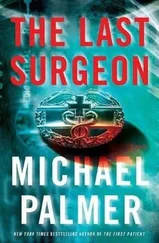Michael Palmer - The Society
Здесь есть возможность читать онлайн «Michael Palmer - The Society» весь текст электронной книги совершенно бесплатно (целиком полную версию без сокращений). В некоторых случаях можно слушать аудио, скачать через торрент в формате fb2 и присутствует краткое содержание. Жанр: Триллер, на английском языке. Описание произведения, (предисловие) а так же отзывы посетителей доступны на портале библиотеки ЛибКат.
- Название:The Society
- Автор:
- Жанр:
- Год:неизвестен
- ISBN:нет данных
- Рейтинг книги:5 / 5. Голосов: 1
-
Избранное:Добавить в избранное
- Отзывы:
-
Ваша оценка:
- 100
- 1
- 2
- 3
- 4
- 5
The Society: краткое содержание, описание и аннотация
Предлагаем к чтению аннотацию, описание, краткое содержание или предисловие (зависит от того, что написал сам автор книги «The Society»). Если вы не нашли необходимую информацию о книге — напишите в комментариях, мы постараемся отыскать её.
The Society — читать онлайн бесплатно полную книгу (весь текст) целиком
Ниже представлен текст книги, разбитый по страницам. Система сохранения места последней прочитанной страницы, позволяет с удобством читать онлайн бесплатно книгу «The Society», без необходимости каждый раз заново искать на чём Вы остановились. Поставьте закладку, и сможете в любой момент перейти на страницу, на которой закончили чтение.
Интервал:
Закладка:
Will was pleased to find that most of the medical society amphitheater’s 140 state-of-the-art conference seats were occupied. As he stepped into the hall, he was immediately surrounded by colleagues wanting some sort of update on the latest in the managed-care killings. As head of publicity and public relations for the Boston chapter for the past two years, Will had expected to be contacted by the press if not the police, but so far nothing.
An eager OB named Runyon, clearly more interested in what he had to say than in any grisly headlines, captured the conversation.
“So, get this one, Will. Twenty-three-year-old woman develops severe abdominal cramping. It’s the holiday weekend, so she gets called by the HMO on-call doc, who phones in a scrip for indigestion. The office is closed for the weekend, so no arrangements are made for follow-up. She is worse by morning and calls again and gets another doc who calls in a different prescription, insinuating that last night’s doc doesn’t know what in the hell he’s doing.”
“Tubal pregnancy,” Will said, anxious to speak with Tom Lemm, the Society president.
Runyon looked crestfallen at having the tag line of his tale preempted.
“Exactly,” he said, speaking to those nearby, as Will had headed off. “She bled out on the way to an ER-as in died . Can you believe it?”
Will spotted Lemm, a family practitioner in his fifties, on the far side of the hall. By the time he reached the man, he had been regaled by a surgeon, whose name he didn’t know, with the story of a woman whose HMO told her to wait awhile to have her thyroid biopsy repeated because the evidence of cancer from the first set of seven painful needle biopsies was inconclusive. Three months later, her husband was transferred to another state and assigned coverage with a different HMO. When the woman’s cancer suddenly began rapidly growing, the new HMO refused to pay for treatment, claiming it was a preexisting condition.
“Hey, Will,” Lemm called out as he approached, “this may be our largest gathering yet.”
He motioned to the crowd, and Will noticed as he followed the gesture that his partner, Susan Hollister, had just entered and was casting about for a seat.
Thanks for showing up, Suze. I owe you one.
“I’ve got a couple of cases, Tom. Do you think they’re appropriate given this latest murder?”
“Are they funny?”
“That depends.”
“On what?”
“On whether you mean funny, ha ha, or funny, all of a sudden I can’t see out of my right eye.”
“Which are these?”
“A little of both.”
“Well, you’re on the agenda. There’s more tension than usual from what’s going on, but I don’t see any reason to withhold an anecdote or two. Tonight it’ll be right after we finish discussing the status of the class-action suit. After your report, we’ll decide what we’re going to do about the big debate against Boyd Halliday next week.”
“What do you mean?”
“I spoke to him an hour ago. He says it would send the wrong message to the public and the killer if he called off the debate.”
The debate, billed as a forum, had been organized by the Wellness Project, a respected independent consumer health-care coalition, and was scheduled for venerable Faneuil Hall in downtown Boston. Halliday, the powerful and dynamic CEO of Excelsius Health, was to be matched up against Jeremy Purcell, a world-renowned surgeon, Harvard professor, philosopher, and former president of the Hippocrates Society. Thanks in large measure to Will’s efforts, publicity for the forum, which was titled Managed Care: Boon or Boondoggle, had been extensive, and a sellout was anticipated. Of course, the managed-care murders had only heightened interest in the event.
“How does Jeremy feel about it?” Will asked.
“I’m surprised you haven’t heard,” Lemm said. “Jeremy’s had a fairly large coronary. He had emergency bypass surgery at White Memorial.”
“And?”
“He’s reasonably stable now, but he won’t be ready for next week. We have to decide what we’re going to do.”
“Halliday’s a force,” Will said, in what he knew was something of an understatement.
“He is that. Listen, I’ve got to get this show on the road. Don’t worry about your stories. If people want to laugh they’ll laugh. I think one of the big reasons we’re getting more members at every meeting is you and your stories.”
“I don’t make them up, I just read them.”
“That’s the point. They’re real.”
“Okay, I’ll do my best.”
“Will, you’re doing great things for this organization, and don’t think we don’t appreciate it.”
“Well, garsh, thanks, Mickey,” Will said in his highly tuned Goofy imitation-the only one in his repertoire.
Lemm, a lean six-footer, shambled up to the podium and silenced the crowd with a few taps on the microphone.
“Three nurses die in an accident and are spirited up to the pearly gates,” he began, without any introductory remarks. “Saint Peter is there and asks each one, ‘Who are you, and why should you be allowed to walk through these gates?’ ‘I was a nurse in a private doctor’s office for forty-five years,’ the first responds. ‘I instructed patients on how to take their medicines; I gave out lollipops to the children-sugar-free, of course.’ ‘Go right in,’ Saint Pete says.
“The second nurse walks up. Same question from Saint Pete. ‘I was a nurse in a hospice,’ she says, ‘and for many years I soothed dying people’s fears of crossing over to the other side, and made the transition a peaceful and enlightening one.’ ‘Please go right in,’ Pete says again. ‘Milk and cookies are on the right.’ The third nurse comes forward. Again, Pete asks about her qualifications for admission. ‘I did case reviews for a managed-care company,’ she says. Pete checks his massive golden book. ‘Ah yes,’ he says, ‘I have you right here.’ He swings open the gate, and as she starts in, he adds, ‘But we’ve only got you scheduled for a three-day stay.’ ”
Laughter from the assembled was enthusiastic, even though Will suspected that most had heard the joke before. Lemm was right. These men and women needed to laugh. Their profession, in many cases their dream, was under constant attack, and the AMA, the organization they had counted on to man the battlements, had mounted a feeble defense. The well-oiled machine of the managed-care industry had cut through the various medical specialties like a thresher.
It probably wasn’t totally fair to draw the analogy between the way managed care overwhelmed the practice of medicine one specialty at a time (giving concessions to the ophthalmologists at the expense of the GPs, then suddenly regulating the ophthalmologists) and the way Hitler swept through Europe a country at a time, but Will was hardly the first physician to see it that way. There was a remarkable, intensely moving Holocaust memorial near Quincy Market in Boston. At the entrance was a quote from a Lutheran pastor named Martin Niemoller.
In Germany they came first for the Communists, and I didn’t speak up-because I wasn’t a Communist.
Then they came for the Jews, and I didn’t speak up-because I wasn’t a Jew.
Then they came for the trade unionists, and I didn’t speak up-because I wasn’t a trade unionist.
Then they came for the Catholics, and I didn’t speak up-because I was a Protestant.
Then they came for me-and by this time there was no one left to speak up.
“Let’s begin this meeting as we do all our meetings with a reading of the roll-physicians who have notified us they are leaving patient care or retiring from medicine prematurely. Their specific reasons vary, but the themes behind them do not. These physicians can no longer handle the paperwork, frustration, and inconvenience to their patients, if not actual danger, of corporate medicine.”
Читать дальшеИнтервал:
Закладка:
Похожие книги на «The Society»
Представляем Вашему вниманию похожие книги на «The Society» списком для выбора. Мы отобрали схожую по названию и смыслу литературу в надежде предоставить читателям больше вариантов отыскать новые, интересные, ещё непрочитанные произведения.
Обсуждение, отзывы о книге «The Society» и просто собственные мнения читателей. Оставьте ваши комментарии, напишите, что Вы думаете о произведении, его смысле или главных героях. Укажите что конкретно понравилось, а что нет, и почему Вы так считаете.












